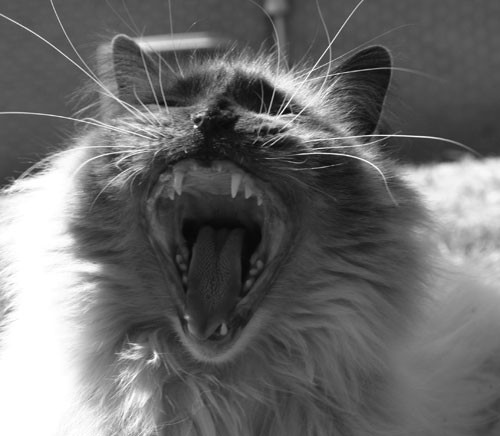
Campus cats call for community contribution (Photo Illustration courtsey of Ben Briscoe)
You may have noticed them before. Eating, scurrying, meowing and hiding behind campus foliage. But for a small group of faculty and staff, these wild cats need more than a casual glance in their direction; they need representation.
According to a brochure for the program, the Feral Cat Program “consists of volunteers who monitor, evaluate and provide humane care” for the campus’s approximately 71 cats in 12 different, established colonies.
The program began several years ago when an elderly women who lived in the SMU area became concerned about the number of homeless cats in and around campus.
“Working with KittiCo, a local non-profit rescue group, she began the feeding and Trap, Neuter and Return protocol on this campus,” said Jacqueline Bradly, a faculty member of the English department and a volunteer for the program.
Although the program cites that SMU has one of the smaller populations of cats than is typical for its size, the FCP says it’s still in need of more volunteers, with only six currently.
One aspect of the program includes feeding and monitoring. According to FCP’s Web site, a feeder’s job consists of setting food out for the cats keeping an eye out for any injuries or illnesses. This is estimated to require one to two miles walking and one hour of time.
The Trap Neuter and Return portion of the program works by first trapping cats humanely with trained volunteers. Those captured felines are then taken to the vet for examination, spaying or neutering and vaccination. After that, the cats are given a painless “ear-tip” for identification purposes, and finally, they are returned to their colony to live out their lives “as natural as possible,” without reproducing. So far this year, 10 cats have been sterilized under the TNR.
Bradly stressed how rewarding working with the cats can be.
“I volunteer because it’s good for both the body and soul, and you can’t say that about too many things in life. I get in my walking exercise a couple nights a week, and I do a good deed by feeding a homeless animal. It’s a win-win opportunity,” she said. “Giving back to the community is always worth the effort.”
IMAGES Administrative Coordinator Althea Webb agreeed with Bradly.
“I’m in it because I love animals. I love cats in particular, and it’s something I can do to help see some of them cared for. There are too many of our fellow creatures that aren’t cared for, are mistreated, abandoned and especially left to reproduce uncontrolled, making the problems worse and worse. I’m thrilled to be in a position to do something substantial to improve the situation even for the small population we have here. Besides that, it’s a way to participate in the well-being of SMU,” Webb said.
The brochure cites other ways to help out the program, such as donating through gift cards available on the Web site, driving slowly through campus streets and driveways, keeping your distance from the cats, whose behavior is often unpredictable, and not disturbing the feed stations or traps displaying FCP labels.
Although the program is partially funded by the Summerlee Foundation and KittiCo, Bradly said donations are still needed to cover the funds that must be independently raised for supplies and emergency medical care of the cats.
The FCP, supported by the KittiCo Cat Rescue and The Summerlee Foundation, will be outside Hughes-Trigg on Thursday seeking more volunteers and selling gift donation cards for the holidays.
If you have any concerns, complaints or would like to know more about the program, contact the SMU police at (214) 768-3333 or leave a voice mail with the FCP at (214) 768-2960.








